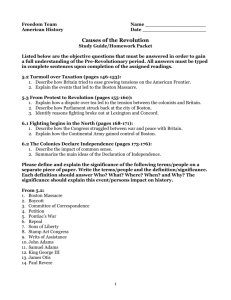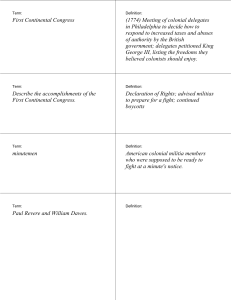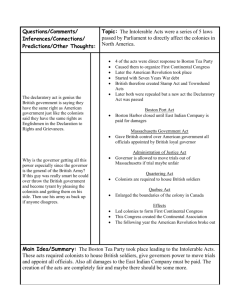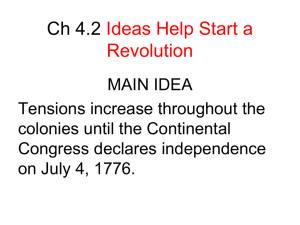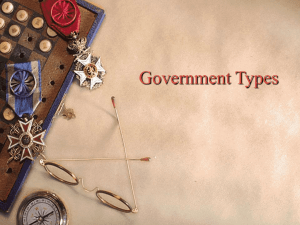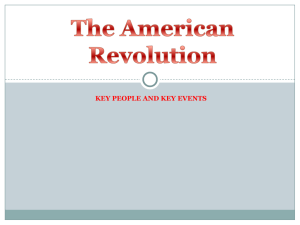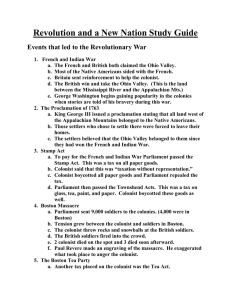Revolution Improved
advertisement
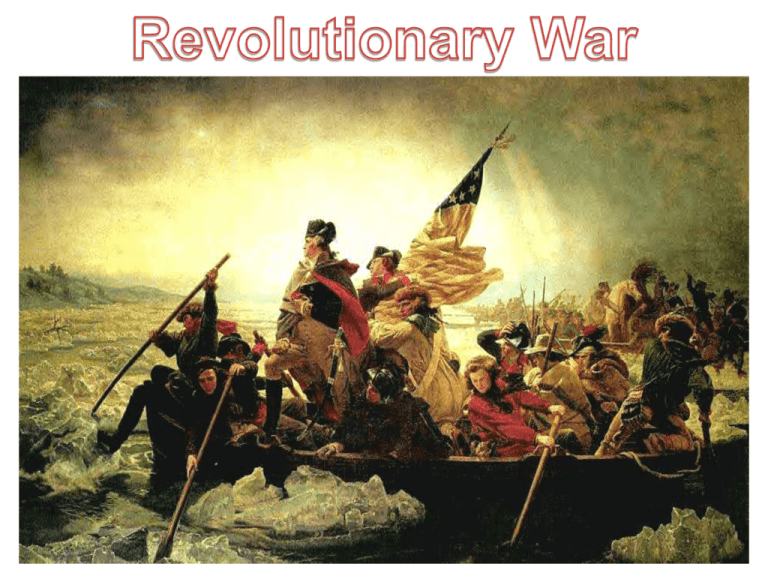
• Stamp Act: March 1765 required piece of paper with a stamp on it for all legal documents. Was repealed in 1766. • Townshend Act: 1769 imposed taxes on imports from Britain including Tea. Remained until the start of the war. (Profiteering also) • Boston Massacre: March 5, 1770 British troops kill five colonists. http://www.youtube.com/watch?v=iloGkp5f_Hk • Boston Tea Party: 1773 King George III gave the British East India Cheers to the Company a pass on taxes for tea imports that the tea selling colonist Lobster Backs. paying. This cut the colonist out of the market. had to continuing (Tea Act) http://www.youtube.com/watch?v=CwEX_YVyAS4 Suckers! • Intolerable Acts: 1774 a series of laws that shut down the Boston Harbor, Quartering Act, made General Thomas Gage governor of Massachusetts and placed Boston under martial law. • The First Continental Congress is formed and shortly after in 1775 the fighting erupts at Lexington and Concord. http://www.youtube.com/watch?v=hiIFRCk1hxY • The Second Continental Congress: May of 1775 a second meeting is held to discuss what to do with the English Rule debate. They recognize the Continental Army in June the same year and appoint G. Washington as their commander. • Battle of Bunker Hill: June 17, 1775 Gage sent 2,400 troops by the end of the battle the colonist lost only 311 men and the British had suffered over 1,000 casualties. This gave the colonists confidence that they could fight with the British. http://www.youtube.com/watch?v=ZdM44rovn6c • Olive Branch Petition: July 8, 1775 Congress sends King George III a letter urging him to return to “the former harmony” between Britain and colonies. He flatly rejected the petition. http://www.youtube.com/watch?v=RDzwtl5Z2cA • Common Sense: as things are heating up in the summer of 1775 a series of essays published written by Thomas Paine attacked King George and the monarchy system. He called King George “the royal brute of Britain.” This essay persuaded a lot of colonists to support the idea of revolution. http://www.youtube.com/watch?v=5JTxVHQAp8w •Declaration of Independence: on July 4, 1776 Congress adopted the Declaration of Independence by unanimous vote. This left the colonists with a decision to make, either be a loyalist to the British crown, or be a patriot and risk possible death for rebelling against it. •The Americans won the war through hit and run tactics; Battle of Saratoga (Forces British to only fight battles on the East Coast and not in the interior parts of America) http://www.history.com/topics/battle-of-saratoga/videos •The Continental Army basically played a game of keep away from the British Army and tried to avoid an open field type of battle unless they had the advantage • The American colonies gained a sense of independence from the French and Indian War (Salutary Neglect in early colonial life) • The Continental Congress heavily debated upon the issue of slavery and eventually had to stop discussing the issue because it was keeping the colonies from uniting • They did not feel that they needed a King and a Parliament that lived thousands of miles away to rule over them anymore • King George III felt that the colonies should help pay off some of the war debt since his army helped to save the colonist from the French and Indian forces in the French and Indian War • The citizens did not feel that they should have to pay taxes because they were not getting representation in the British Government (Parliament) •The only advantages that the Americans had in the Revolutionary war was the fact that they were fighting on familiar land, the leadership of George Washington (Valley Forge), and the fact that they had a specific cause that people were willing to die for, and the French as an ally •Had many disadvantages like raising revenue for the war (inflation through printing too many Continentals) Soldiers with improper uniforms because of lack of production, supplies, and money to fund the war •Battle of Yorktown marks the end of the fighting between the Colonists and British http://www.history.com/shows/america-the-story-ofus/videos/yorktown •Treaty of Paris marks the end of the war in 1783 •Egalitarianism: a belief in the equality of all men begins to spread throughout the colonies •Republicanism: the idea that people can choose a government by electing representatives through voting to make decisions for them based on what is good for the entire republic


